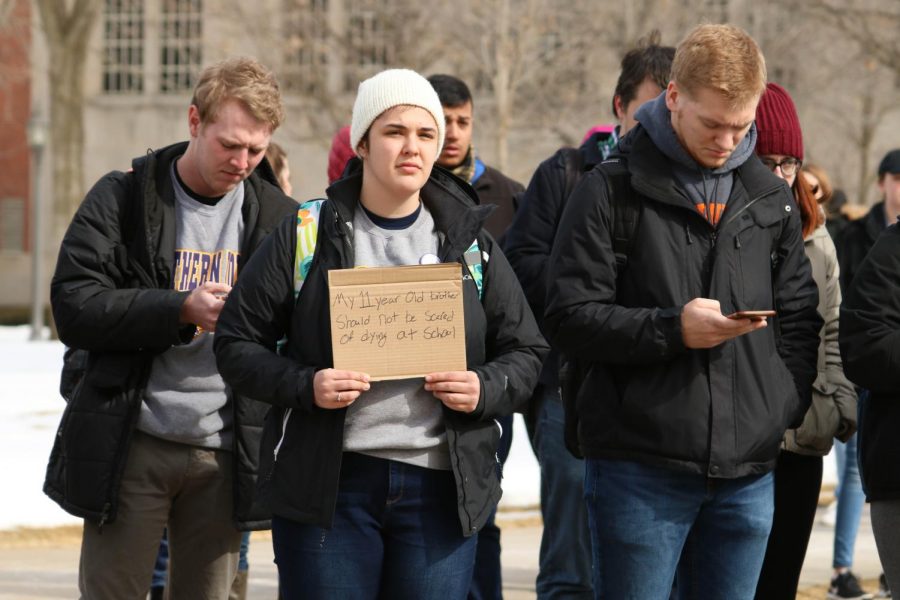Political views continue to change on campus
Apr 26, 2018
In an age of increasingly polarized politics, college campuses have become political battlegrounds for liberals and conservatives alike, with protests erupting across the country. However, the education students receive can have a big impact on how they view politics and the world.
“The liberal arts core classes [LACs] were some of my best experiences in college,” said Chris Merck, a junior political communications major. “You learn how to structure your arguments better, and you get introduced to lots of different ideas and concepts.”
The liberal arts core is designed to introduce students to new ways of thinking about complex issues. From politics to philosophy, first-year students often have their previous perceptions challenged, as was the case with Carter Williams, a sophomore philosophy major.
“I think [LAC’s] were valuable in the sense that they give students a well-rounded experience and inform them in ways that they might not be otherwise,” Williams said. “Humanities introduced me to Marx. ‘China’ further introduced the idea and provided a further overview of Chinese and global politics.”
One common theme among students is the apprehension to engage in politics within either Republican or Democratic establishment channels.
“I’m definitely farther left than the Democratic establishment,” Williams said. “The Democratic Party is tearing the leftists down.”
Nate Borg, a sophomore political science major and self-described libertarian, cautioned students not to be absolutist when identifying with a party or a politician.
“Maybe I agree with someone on one issue, but they’re an idiot on another,” Borg said. “Do not consider yourself a disciple of one politician. Don’t get to the point where everything they say is gospel.”
According to a 2005 Gallup poll, 71 percent of college students’ political ideologies were no different than that of their parents. However, various students emphasized how their upbringings shaped their politics after reaching UNI’s campus.
“My family is so conservative. My mom is a cop, and my step-dad is the county sheriff,” said Elle Boeding, a freshman political communications major. “But, I saw so many flaws in what they were saying. Why don’t we care about everyone? Why don’t we want to help everyone?”
Although it is important to challenge oneself ideologically, several students said it’s important to have a healthy mix between adversarial and agreeable discourse.
“I definitely think it’s important to be part of a group with similar viewpoints to provide that support structure,” Merck said. “However, I think it’s very important to be challenged in your views, so you can adjust them as needed.”
But not all students shared a favorable view of finding comfort in groups with a similar ideology.
“Part of me is like, ‘It’s good to be around other people who think like you,’ but then there’s a confirmation bias,” Boeding said. “A conservative isn’t going to change my mind, but if you sit down with them, you can understand their arguments better.”
“Don’t bubble yourself,” Borg cautioned. “It’s kind of hard to think critically if you stay in a tribal group, and I think it’s kind of gross when people don’t bother analyzing their views critically.”
White supremacy and privilege have also become topics of discussion from the events of Charlottesville to discussions of diversity in Northern Iowa Student Government. Williams made an impassioned plea for white students to understand how their privilege and position should influence their politics.
“I’m a white middle-class American; I didn’t grow up with any disadvantage,” Williams said. “The people that have it worse, I can feel with them. I’d like to see a state that helps everyone, not just the wealthy. Every policy Republicans support doesn’t even help the white middle-class, but the white, wealthy class. There is a white hierarchy. Don’t fall into any privilege you have.”
Upperclassmen also encouraged incoming students to take advantage of the political opportunities these organizations present.
“Especially if you want to learn about politics, you should get involved,” Merck said. “You’ll be exposed to different viewpoints even within the same organization or party.”
Like many first-year students, Williams was apprehensive about the focus on being involved in student organizations.
“When people told me to get involved, I was like ‘f— off,’” Williams said. “But now I would definitely recommend [students to] get involved. Create yourself politically and don’t let cultural constraints hold you back.”
According to Merck, having changing views of political issues in college can be a boon.
“My politics have changed, but that’s not necessarily bad,” Merck said. “I know in several classes I have had my views challenged, and I adjusted them accordingly after looking at their viewpoints and trying to rationalize those. Before college, I was very to the right, but now I’m more moderate.”
There are various political groups on both sides of the political spectrum that are accessible to new students.
The Young Democratic Socialists, Northern Iowan Democrats, UNI College Republicans and Young Americans for Freedom are some of the political organizations that students can join to become active in the political process.














